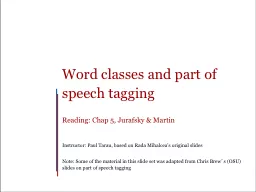PPT-Categorizing and Tagging Words
Author : test | Published Date : 2019-03-12
Chapter 5 of the NLTK book Plan for tonight Quiz Part of speech tagging Use of the Python dictionary data type Application of regular expressions Planning for the
Presentation Embed Code
Download Presentation
Download Presentation The PPT/PDF document "Categorizing and Tagging Words" is the property of its rightful owner. Permission is granted to download and print the materials on this website for personal, non-commercial use only, and to display it on your personal computer provided you do not modify the materials and that you retain all copyright notices contained in the materials. By downloading content from our website, you accept the terms of this agreement.
Categorizing and Tagging Words: Transcript
Download Rules Of Document
"Categorizing and Tagging Words"The content belongs to its owner. You may download and print it for personal use, without modification, and keep all copyright notices. By downloading, you agree to these terms.
Related Documents














